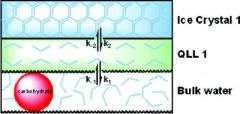Better antifreezes to preserve donor organs for transplantation

Chemists in Canada have developed a new approach for producing more effective medical antifreeze fluids for preserving kidneys, hearts, and other organs donated for transplantation. These next-generation antifreezes can decrease damage to organs caused by ice crystals, and thus prolong the time a donated organ will remain viable prior to transplantation. This could increase the number of available organs for potential recipients. Their study is scheduled for the current issue of the Journal of the American Chemical Society.
Robert N. Ben and colleagues note that the growth of ice crystals is a major cause of damage to cells, tissues and organs during cryopreservation, which leaves them unusable for transplantation. To address this challenge, the researchers developed synthetic antifreeze materials, called C-linked antifreeze glycoprotein analogues (C-AFGP). These proteins contain a sugar coating and have custom-tailored antifreeze activity.
Now the scientists describe the development of "hydration index" that can be used to more reliably predict how prospective antifreeze materials will behave. Their index provides a clearer picture of how water molecules interact with the sugar component (as well as native AFGP) and affect their chemical behavior. This is a key to understanding their ability to resist the formation of ice crystals when chilled.
Article: "Hydration Index – A Better Parameter for Explaining Small Molecule Hydration in Inhibition of Ice Recrystallization", pubs.acs.org/stoken/presspac/p … ll/10.1021/ja806284x
Source: ACS

















